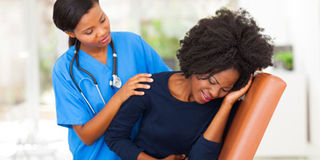Doctors, scientists should do more to tackle reproductive ailments

It’s time for workplaces, schools, families, policies and laws to acknowledge that menstrual cramps are not just minor “women’s problems”, but serious, medical challenges that require serious, holistic solutions, Naisola Likimani argues. FILE PHOTO
What you need to know:
- What starts out as a typical reproductive function ends up with radio personality Njambi Koikai in hospital with collapsed lungs. Like many others who have heard her story, I find this near impossible to wrap my head around.
- Doctors have been prescribing hot water bottles for years, as if one has a sore muscle in one’s neck. Then they prescribe painkillers, and almost always a contraceptive pill, prescribed even at the tender age of 13.
- I write this as a challenge to the scientific and medical community: It’s time to prioritise women’s reproductive health issues. It’s time to stop dismissing women and girls’ pain and invest resources and time in finding real solutions.
Over the past few months I have been following Kenyan radio personality Njambi Koikai’s painful journey with thoracic endometriosis. While I’m intimately acquainted with endometriosis, I had never heard of this particular type. What starts out as a typical reproductive function ends up with Njambi in hospital with collapsed lungs. Like many others who have heard her story, I find this near impossible to wrap my head around.
Like many women, however, I am no stranger to endless stories of women’s struggles with menstrual cramps, heavy menstrual bleeding, fibroids, endometriosis, birth control side effects, and more, which interfere with daily life and significantly diminish their general quality of life.
Bring up the topic of cramps or fibroids and the woman next to you is likely to have an even more horrifying tale to tell, either her own or of someone close to her.
Statistics on these ailments in Africa or even Kenya are hard to come by, but anecdotally these reproductive challenges are all too frequent as to be almost ordinary. You don’t even have to know very well the woman sharing the story. We are bonded by our often secret pain, and by the pure neglect from the medical community.
'AS BAD AS A HEART ATTACK'
Recently, an American study showed that period pain can feel as bad as a heart attack, yet our medical community treats this as a minor, natural condition that all women face – a mere inconvenience that only weak women complain about. There is still much shame in missing work or school for “monthly issues”. Doctors have been prescribing hot water bottles for years, as if one has a sore muscle in one’s neck. Then they prescribe painkillers, and almost always a contraceptive pill, prescribed even at the tender age of 13.
What is baffling is that if women and girls have been experiencing these ailments for years, and if they are so common and severe, where are the cures?
I have experienced debilitating menstrual cramps almost from my first period at age 12. After the usual dismissive treatment by doctors (“it will go once you have a baby”), taking birth control pills and progressively stronger pain medications, I realised that this was my lot and did my best to work my life around it.
Only when I went to the United States for college was I diagnosed with endometriosis. I learned that the lining that formed inside my uterus every month was also forming on other organs, resulting in severe pain and other symptoms. I had my first surgery in 2002 to remove the endometrial lesions, and for a spell my cramps decreased, though they never disappeared. I also continued on and off with prescribed birth control pills.
TREATING ONLY SYMPTOMS
This, however, is still in the realm of treating the symptoms. What causes endometriosis? How do we cure it? Can we prevent it? No one had answers, not even the gracious female specialist I consulted. The only solution? Put my body into early menopause for six or so months. This has apparently proven to prevent the growth of new cells.
Menopause? I was in my early twenties! What are the side effects? Will it come back? Several side effects, and yes, the endometriosis will come back, was the response. To which my response was an emphatic “No, thanks”.
I had my second surgery 10 years later as the debilitating pain returned and I resumed taking heavy painkillers and using a TENS machine, essentially using small electric shocks to manage the pain. This time the surgery was in Kenya, and this specialist, 10 years later, also recommended early menopause as a temporary treatment. I once again unequivocally rejected this. And the journey continues to this day.
I write this as a challenge to the scientific and medical community: It’s time to prioritise women’s reproductive health issues. It’s time to stop dismissing women and girls’ pain and invest resources and time in finding real solutions. It’s not acceptable not to know what causes fibroids. Or heavy bleeding. Or endometriosis. All the while pumping women full of hormonal treatments and tranquilizer-level pain medication.
It’s time to stop recommending childbirth as a solution for menstrual cramps. It’s time for workplaces, schools, families, policies and laws to acknowledge that these are not just minor “women’s problems”, but serious, medical challenges that require serious, holistic solutions.
The writer is a policy specialist in gender equality and sexual and reproductive health and rights. She writes here in her own capacity.




